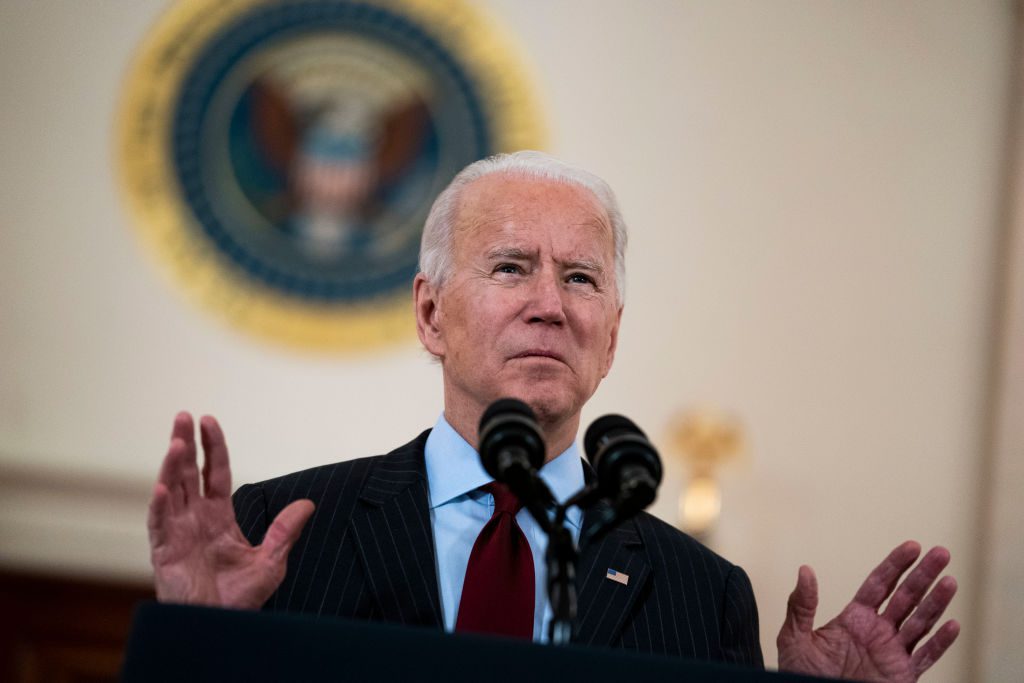Inside Biden’s Spiraling Attempt at a Russian Deal

It was the stuff that would have gotten his predecessor crucified in the news cycle.
Speaking at the White House last week, with a veritable contact high off the announcement of his planned withdrawal from Afghanistan, Biden sounded like a man in search of bigger fish. His remarks followed weeks of whispers in Washington. Biden the veteran Washingtonian, Biden the longtime Democratic establishmentarian, Biden the old codger, privately wanted the most unlikely of deals: with the Kremlin.
For a moment, it looked true.
Laying fresh sanctions on top of the raft of sanctions already levied against the Russian Federation and its highwayman elite, Biden sounded downright off the reservation. “Nord Stream 2 is a complicated issue affecting our allies in Europe,” Biden said, noting his past opposition. “But that still is an issue that is in play,” the president finished, then promptly walked out of the room.
President Donald Trump’s outgoing administration, in January, told European companies potentially involved in the construction in Russian President Vladimir Putin’s marquee infrastructure program that they could face the wrath of sanctions. It was the parting shot of Trump’s administration, one that for all the president’s ill-advised niceties toward Putin the man, and for all the (largely discredited) suspicions about his White House and Moscow, wound up being the most anti-Russian American administration since Ronald Reagan’s.
That is, if sanctions and threats to the assets of the Putinite elite meant anything to the men in Moscow, and here’s saying they did. It was Reagan himself who famously warned the Europeans not to rely on the Russian state for gas, of course veering into the Trumpian realm of sabotage. So, for a Democratic Party that for years allowed a Manchurian candidate narrative to fester against a rival sitting president, that posited Moscow as the international hub of everything from the alt-right to the very end of America, its leading standard-bearer conceding that he kind of didn’t care about Nord Stream 2 was truly a development—and most certainly not one his predecessor would have gotten away with. “It’s a unipolar world now,” a former senior Hillary Clinton staffer told me in the spring of 2017. And it was Russia, somehow, in the saddle. What a difference four years makes.
But then the deluge.
The potential architect of any rapprochement with the Russians was given a proper, springtime Washington salutation. The Kennan Institute director at the Wilson Institute, Matthew Rojansky, was floated for the job of Russian affairs director on the National Security Council. He was then promptly dumped by Biden when the water got a little hot. The brief ordeal now is forever immortalized on Google with major headlines such as “Biden eyes Russia adviser criticized as soft” and then “Biden won’t bring on controversial Russia expert.”
This is becoming something of a habit for the new president. Biden let Matthew Duss, the chief foreign policy aide to the most prominent Jewish politician in U.S. history, be pilloried as a senior advisor with “an anti-Israel history,” before Duss eventually just withdrew from consideration for a role at Antony Blinken’s State Department.
If Rojansky is Putin’s patsy, he certainly didn’t talk like one. In my experience, Rojansky is a tough-minded subject matter expert. He does not pursue the absolute hardest line against a peripheral nuclear power with schizophrenic zeal, it’s true. But if he was to be Biden’s Metternich for some grand, feared deal with Moscow, he certainly didn’t act like it. The last time I heard him speak, last August, Rojansky said that the chances for a sweeping accord (the potential deal Biden was floating in his planned summit with Putin this summer) were essentially nil, no matter the leadership of the next administration. Perhaps he was too prescient for his own good.
The danger for Biden’s administration is simple, and classic: too many chiefs, and not enough Indians. Ron Klain’s early days show flashes of him becoming the most powerful White House chief of staff since James Baker, which sets a tone—and a political one. Add in the relatively young leadership of the State Department by Blinken (59) and the NSC by Jake Sullivan (41). But the duo must share an orbit with ex-officio Democratic Party grandees. Former Secretary of State John Kerry has an office in the White House, a testament to his William Seward-style permanence in the political game, no matter who the president is. And former National Security Advisor Susan Rice, sort of bizarrely given her past resume, now heads the Domestic Policy Council.
How much of any one decision, especially a controversial one, is even Mr. Sullivan’s to make? The Republic of Korea said on Thursday that the United States is conducting a “serious review” of a proposed end-of-war declaration with North Korea. South Korea’s liberal president, Moon Jae In, teased such a maneuver in an interview with The New York Times, urging further talks with the North, the kind Biden condemned when Trump was the one doing them. It could mean, after nearly seventy years, a peace treaty. Seoul had just better hope Biden won’t be employing the Russia model.
Comments